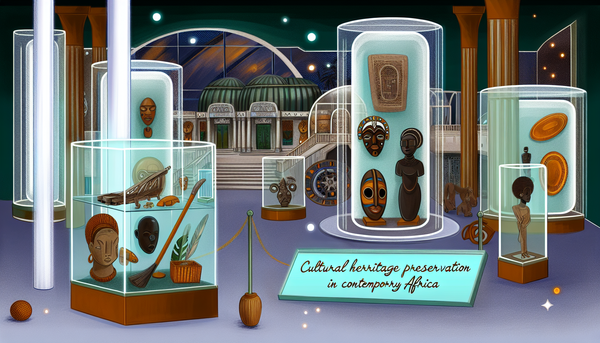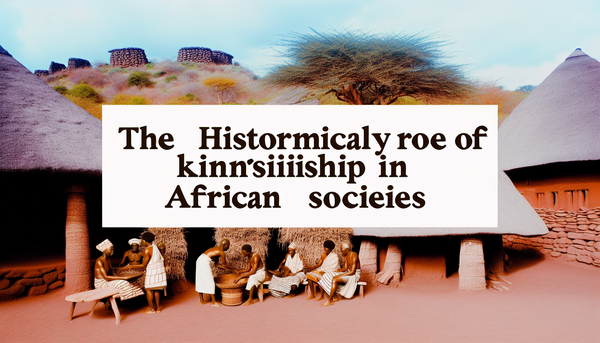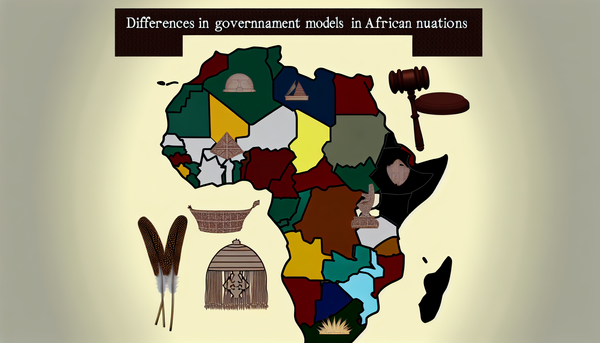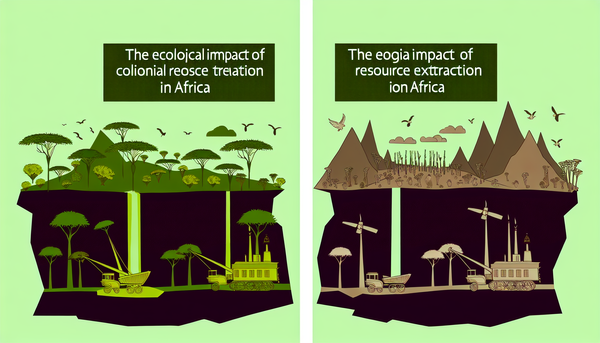The Legacy of the African Traditional Governance Systems

Cultural Identity and Social Structure
African traditional governance systems are deeply intertwined with the continent's diverse cultural identities. These structures often reflect the rich heritage, languages, customs, and beliefs of various ethnic groups. Leaders in traditional societies, such as chiefs and elders, not only serve as political figures but also act as custodians of cultural values and social norms. Their authority stems from both lineage and the collective respect of the community.
The organization of society around kinship and communal ties is paramount in these governance systems. Decisions are frequently made through consensus, emphasizing collective well-being over individual interests. This participatory approach fosters a sense of belonging and unity, reinforcing social cohesion.
Moreover, traditional governance plays a critical role in maintaining social order by establishing codes of conduct and practices that guide behavior. Rituals and ceremonies, often facilitated by these governance structures, help in passing down cultural narratives and history, ensuring that the community's identity is preserved and celebrated.
Overall, the legacy of African traditional governance systems underscores the importance of cultural identity and social structure in shaping communities, providing them with frameworks for living harmoniously while respecting their unique histories and traditions.
Influence on Modern Legal Frameworks
The foundational principles of African traditional governance systems have significantly influenced contemporary legal frameworks across the continent. These systems, rooted in customs and communal consensus, offer insights into justice, law, and social order that resonate well with modern legal practices. Many African nations have integrated elements of customary law into their legal systems, recognizing the importance of local traditions alongside formal statutes.
For instance, the principles of restorative justice, common in traditional governance, emphasize reconciliation and community participation rather than punishment. This approach is increasingly being adopted in judicial reforms aimed at addressing the shortcomings of punitive legal systems. The respect for elders and community leaders, as mediators in disputes, reflects a societal preference for local involvement in governance and the adjudication process.
Additionally, the emphasis on collective rights, as seen in traditional governance, has encouraged the recognition of communal land rights and the protection of indigenous resources in modern constitutions. This adaptive legal environment fosters social stability by acknowledging and accommodating the diverse cultural contexts of African societies. Consequently, the integration of traditional governance elements into modern legal frameworks not only promotes justice but also strengthens the roots of democratic representation and cultural preservation.
Environmental Management Practices
African traditional governance systems exemplify sustainable environmental management practices that have been relied upon for generations. Local communities possess a profound understanding of their ecosystems, cultivated through centuries of interaction with nature. These practices often prioritize the holistic relationship between people, land, and resources, promoting stewardship over exploitation.
Traditionally, many societies implemented rotational grazing and farming techniques, allowing for the regeneration of land and biodiversity. This cyclical approach ensured that resources would remain available for future generations, reflecting an early understanding of sustainability. Additionally, sacred groves and conservation areas were established, often overseen by local chiefs, to protect vital habitats and species. Such practices not only safeguarded biodiversity but also reinforced community identity and cohesion.
Water management is another key aspect of environmental governance in traditional societies. Communal wells, water-sharing agreements, and rituals surrounding water conservation exemplify the collective responsibility, encouraging sustainable usage while preventing depletion.
Today, as climate change poses increasing challenges, many contemporary environmental initiatives are reflecting these age-old principles. By integrating traditional ecological knowledge with modern conservation efforts, communities can better navigate environmental challenges while preserving their cultural heritage. This synergy of past and present emphasizes the critical role of traditional governance in fostering ecological resilience and sustainability.
Economic Impact and Resource Distribution
African traditional governance systems profoundly influence economic practices and resource distribution within communities. Rooted in principles of equity and communal responsibility, these systems promote collective ownership and shared resources, which are vital in mitigating poverty and enhancing social welfare.
In many societies, agricultural practices are organized around communal land management, where land is not merely a commodity but viewed as a communal asset. This collective approach facilitates equitable distribution of resources, allowing families access to land and agricultural tools necessary for sustenance. Furthermore, traditional leadership often plays a crucial role in overseeing these economic activities, ensuring fairness and adherence to community norms.
Additionally, barter systems and cooperative trading methods, customary in traditional societies, foster local economies and empower marginalized groups to participate in economic transactions without reliance on external markets. The emphasis on local production for local consumption not only strengthens community ties but also enhances food security.
As African nations adapt to global economic trends, integrating traditional economic practices into modern frameworks can yield significant benefits. By acknowledging the value of communal practices and equitable resource distribution, contemporary economies can harness the strengths of both traditional wisdom and modern innovation, promoting sustainable development and social equity in local contexts.
Community Engagement and Social Bonds
Community engagement is a cornerstone of African traditional governance systems, fostering strong social bonds that unite members and enhance collective resilience. These systems prioritize participatory decision-making, where community members, regardless of age or status, have a voice in the governance processes. This inclusivity not only promotes transparency but also builds trust among members, reinforcing social cohesion.
Rituals, ceremonies, and communal gatherings play a critical role in strengthening these social bonds. Events such as harvest festivals, initiation rites, and community meetings serve to celebrate shared values and achievements, helping to cultivate a sense of belonging and identity. Through such practices, traditional governance encourages cooperation and solidarity, essential for overcoming communal challenges.
Furthermore, mutual support networks, often organized under traditional leadership, facilitate resource sharing during times of need. Whether in times of illness, loss, or economic hardship, these networks embody the principle of "Ubuntu," emphasizing that individual well-being is intertwined with the welfare of the community.
As modern societies grapple with increasing isolation and fragmentation, the lessons from traditional governance systems—rooted in community engagement and strong social bonds—offer valuable strategies for fostering unity, resilience, and collaboration in addressing contemporary issues, ultimately improving the social fabric of communities.
Conflict Resolution Mechanisms
Conflict resolution in African traditional governance systems is characterized by community-centered approaches that prioritize dialogue, reconciliation, and restorative justice over adversarial methods. These mechanisms are deeply rooted in cultural values that emphasize harmony, respect, and the importance of relationships within the community.
Elders and respected leaders often act as mediators in disputes, leveraging their wisdom and experience to facilitate discussions between conflicting parties. This informal yet authoritative role enables them to maintain impartiality and foster understanding, encouraging parties to reach mutually agreeable resolutions. The emphasis on consensus is crucial; conflicts are often resolved through negotiation and compromise, ensuring that all voices are heard.
Traditional practices, such as communal rituals or ceremonies, play a vital role in the healing process following conflicts. These rituals not only reaffirm social bonds but also provide a structured environment for addressing grievances, allowing communities to restore relationships and prevent future disputes.
Moreover, the principle of reparative justice—focusing on restoring the victim and the community—highlights the commitment to societal healing rather than punishment. As societies face increasing conflict due to modern challenges, integrating these traditional conflict resolution mechanisms can offer effective, culturally relevant solutions that promote peace and unity within communities.
Heritage Preservation and Education
Heritage preservation and education are vital components of African traditional governance systems, serving to maintain cultural identity and transmit knowledge across generations. Central to this process is the oral tradition, where stories, proverbs, and teachings are shared to instill values, history, and communal wisdom. Elders play an essential role as custodians of this knowledge, imparting life lessons and cultural practices that shape the identity of community members.
In many traditional societies, education is not confined to formal institutions; rather, it occurs within the community through mentorship and experiential learning. Skills related to agriculture, craftsmanship, and local governance are taught through active participation in community activities, fostering a deep connection to one’s heritage. This hands-on approach not only preserves traditional practices but also strengthens social bonds.
Ceremonial events and festivals serve as platforms for the celebration of cultural heritage, showcasing traditional music, dance, and art. These gatherings reinforce collective identity and promote intergenerational dialogue, ensuring that cultural practices are not lost to modernization.
As contemporary societies grapple with globalization and cultural homogenization, prioritizing heritage preservation and education through traditional governance models can enhance community resilience, identity, and cohesion, nurturing pride in cultural diversity while fostering a sustainable future.



